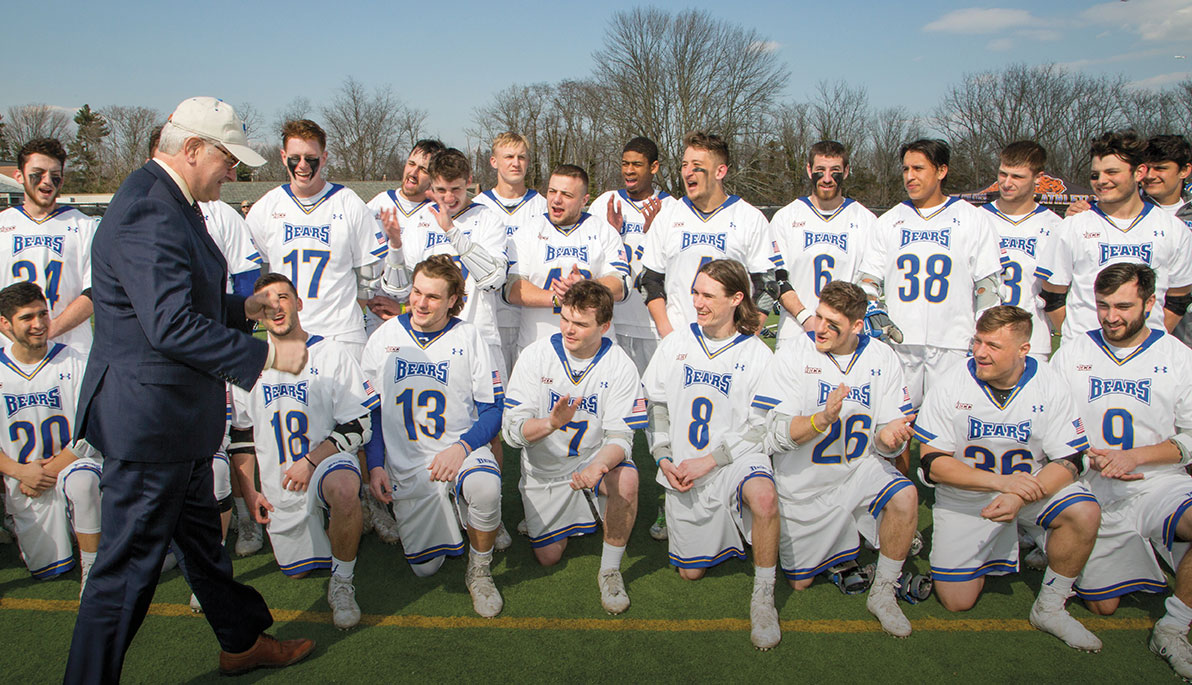
Every Success Counts
August 17, 2018
Photo: President Foley presided over the ceremonial face-off as NYIT’s men’s lacrosse team took on Wheeling Jesuit at President’s Stadium in Old Westbury on April 11.
In April 2018, nearly a dozen events gave the NYIT community a chance to hear about President Foley’s vision, learn about groundbreaking faculty and student research, give back to the community, and celebrate with colleagues and classmates.
Our future begins with the students at NYIT. They are the innovators and inventors, entrepreneurs and educators, makers and doers who will imagine the impossible and make it a reality. But to do so, they need the courage to think for themselves, the knowledge to develop new technologies, and the insight to understand the moral and ethical implications of using that technology. Hank Foley, Ph.D., emphasized those points along with other elements of his vision for NYIT when he was installed as the university’s fourth president during the second week of April.
#NYITCommunity
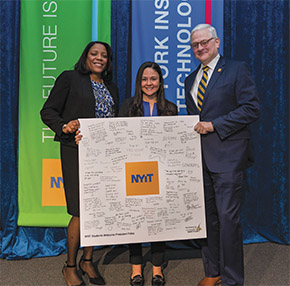
Melanie Austin (B.S. ’00) (left), Lexi Ruiz, and President Foley hold up a poster signed by well-wishers at the kickoff event.
“Could I get everyone to lean in? Now, say ‘technology’!”
That was Lexi Ruiz’s directive to the audience when she spoke at the week’s kickoff event on April 9. After taking a selfie of the group, she posted it to the university’s Instagram account. Easy. Ruiz, a psychology major and an attacker for NYIT’s first women’s lacrosse team, is part of a generation unfazed by technology. She is also the definition of an NYIT student. “We’re proactive, and independent, and collaborative. We’re creative, and open, and more than a little bit geeky—and that’s a good thing,” she said.
Including all members of the community in Inauguration Week was key for the president. In addition to Ruiz, Assistant Professor of Occupational Therapy Melanie Austin (B.S. ’00), O.T.D., M.P.A., addressed the audience at the kickoff event; third-year medical student Samantha Gottlieb and Fred Harris (B.S. ’08, M.B.A. ’10), then senior vice president and technology risk officer at Bank of America and currently technology executive at Societe Generale, spoke at the official installation ceremony on April 12. (Alumni also connected with prospective students at a legacy event on April 11.) “We have a strong foundation from which we can lift NYIT into a top institution, but we won’t be able to do it without the support of the entire NYIT community—all of you,” noted Foley in his remarks during the kickoff event. “By creating a culture of excellence for teaching, research, and service, NYIT can prepare students to lead productive and successful lives.” Throughout the week, efforts to create that new, more engaged culture were on display—including at NYIT’s first blockchain symposium.
#NYITBlockchain

Panelists at “Business Model of the Future.” From left to right: Steven Shapiro; Paul McNeal, founder, The Crypto Curator; Selva Ozelli, Esq., CPA, international tax attorney; Maggie Parent; Sunil G. Singh, CEO, ServerCube, Inc. and DBMS Consulting, Inc; Jonathan Brovda; and Richard J. Daly (B.S. ’74).
So, What Is Blockchain?
Arshit Arora, computer science major and co-developer with Denisolt Shakhbulatov of a blockchain-based news platform, Avaz, explains: “It’s a distributed database. Say you have a roomful of people, and one person says, “Two plus two equals five.” You cannot trust just that one person, but if the majority agrees on something, that’s called a consensus. In a distributed database, you cannot rely on what one computer says, but you rely on the majority of them because they all have the same information and they’re processing it at the same time. When the majority agrees upon the answer, it’s saved, and the computers move on to the next calculation. [The process is] anonymous, but you can see all of the transactions on the public ledger.”
As the university was gearing up for inauguration events, Facebook founder and CEO Mark Zuckerberg was preparing to appear before Congress about his company’s mishandling of personal data. His testimony, and the buzz surrounding it, underscored the necessity for NYIT to incubate thought leadership and thoughtful research.
Blockchain is one of the latest “disruptive technologies” to make headlines. And while many people are still confused by how blockchain works, industry leaders are scrambling to incorporate the technology into their business practices—beyond bitcoin.
“The world is changing again and again, and changing fast,” said President Foley, who wrote about blockchain’s potential use in research in an April op-ed in Scientific American. “We don’t know where it’s going. That’s both exciting and frightening to all of us.”
To help uncover the mystery, NYIT hosted the symposium “Where Blockchain Leads” on April 12 at NYIT Auditorium on Broadway.
“[Blockchain] promotes peer-to-peer connections, eliminating the centralized government or banks while cutting costs of the middleman,” said New York Times journalist and author Teddy Wayne in his keynote address at the symposium. While he discussed how blockchain could be used in myriad applications, Wayne also warned about the dangers of investing in overhyped cryptocurrencies, saying, “I would caution to treat it like gambling and not get involved in day-trading in the volatile crypto market, as the profits often accrue to bots or colluding groups and not to individuals.”
Following the keynote, experts in the business, technology, legal, and commerce sectors debated the technology’s potential profits and pitfalls in two panel discussions led by Nada Marie Anid, Ph.D., then dean of NYIT School of Engineering and Computing Sciences and current vice president for strategic communications and external affairs; Jess Boronico, Ph.D., dean of NYIT School of Management; and Steven Shapiro, Ph.D., professor of finance, management, and economics.
The second panel featured NYIT alumni and students sharing the stage. Richard J. Daly (B.S. ’74), CEO of Broadridge Financial Solutions, Selva Ozelli (B.S. ’85), and NYIT student and entrepreneur Jonathan Brovda served as panelists for “Business Model of the Future.”
“Blockchain is going to be used to address complicated transactions that are grossly inefficient. This is actually going to transform the way we do business,” said Daly. “We’re investing in it,” added Maggie Parent, executive vice president for Voya Financial, “because we have a lot of irritating things we do every day that blockchain can help—so much of what we do is ‘to-ing and fro-ing’ over a transaction.”
Chris Tse, CTO of Dot Blockchain Media who spoke in the first panel, “Blockchain Big Picture,” pointed to blockchain’s most promising attribute: “It’s a mechanism for trust. It provides an opportunity for parties to coordinate and convey transactions to ensure that not one entity is in control.”
Computer science students and business partners Arshit Arora and Denisolt Shakhbulatov, who demonstrated the platform during the symposium, are relying on that trustworthiness to make their news platform, Avaz, a success. “My father [a journalist in Russia] has told me of backlash he has faced for not writing pro-government stories and for not having a Russian name. We wondered how we could fix these problems,” said Shakhbulatov. Arora added: “You should be able to speak your voice. … [With Avaz], you don’t have to show your identity, but you can still say whatever you want. Because of blockchain, the records can be immutable.”
#NYITResearch
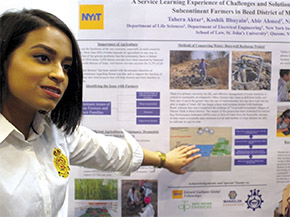
Student Tahera Aktar at SOURCE.
Arora and Shakhbulatov are among the many students who have drawn on critical and design thinking to solve hard problems. At the 15th annual Symposium of University Research and Creative Expression (SOURCE) on April 13, more than 180 undergraduate and graduate students displayed their critical creativity before their peers and professors. Tahera Aktar, a life sciences student, presented a poster on her service learning trip to villages in the Beed district, Maharashtra (India). Partnering with nonprofit Save Indian Farmers, she observed how farmers are affected by environmental and economic factors. “It makes us feel like brand ambassadors for [Save Indian Farmers],” she said of the opportunity. “We get to come out here and talk about them, because they don’t have the time or the resources to get out here and speak at these kinds of events.”
Students also participated in a series of NYIT School of Architecture and Design exhibitions and workshops held during Inauguration Week, including a presentation by the team that traveled to Puerto Rico to rethink housing for disaster relief and an exhibit of design entries for a competition to build a bionic, health-inspired stone pavilion on the Long Island campus.
To create projects of this caliber, students need guidance from professors who understand the rigors of academic research. “Invigorating the undergraduate experience here with research and scholarship is absolutely necessary,” said President Foley. “So do we want to increase it at NYIT—yes. Unequivocally, we do. It’s good for our culture, it’s good for our economy, it’s good for ourselves, and it’s good for our students.”
Faculty Research in 2017
- 111 authors with 281 publication credits
- 95 presenters with 336 conference presentations
- 30 honorees with 87 awards
- 4 designers with 7 exhibitions
- 139 grant recipients with 220 grants received (internal and external)
- 2 patent holders with 4 patents
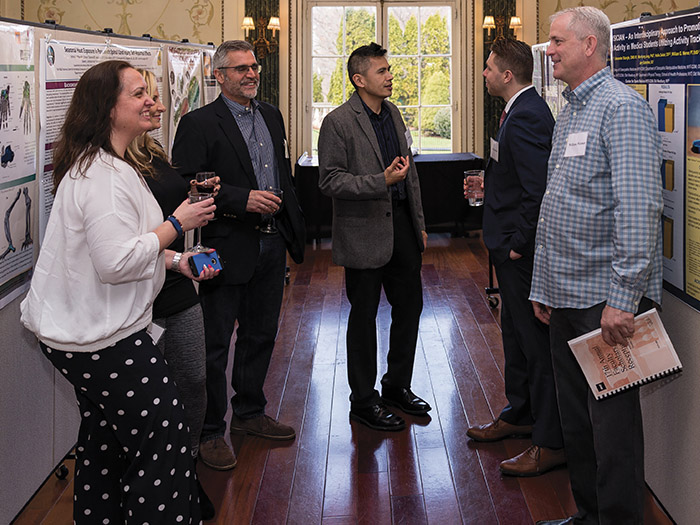
Faculty mingle in front of poster presentations at the 17th Annual Faculty Scholars Reception.
NYIT faculty members had their chance to present research on April 10 at the 17th Annual Faculty Scholars Reception, which recognized the work of nearly 180 scholars, scientists, professionals, and researchers. In the first of three presentations by faculty members, Colleen P. Kirk, M.B.A., D.P.S., assistant professor in NYIT School of Management, spoke about conduct most would hate to admit practicing: territorial behavior when shopping. Her research proves what many of us have felt—people often take “psychological ownership” over something before they buy it. Furthermore, they retaliate if they feel infringed.
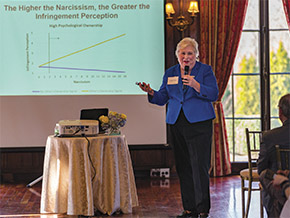
Colleen Kirk presents her research on psychological ownership at the Faculty Scholars Reception.
“Marketers need to be aware of these issues, because their actions and words might unknowingly elicit negative feelings associated with infringement,” said Kirk. To help avoid awkward situations, Kirk says that marketers should provide ways for consumers to protect their psychologically owned items prior to purchase. Yes, even a plastic divider at the grocery checkout can prevent a consumer meltdown.
Read more about the other two faculty presenters, Assistant Professors N. Sertac Artan, Ph.D., and Bryan Gibb, Ph.D.
#NYITService
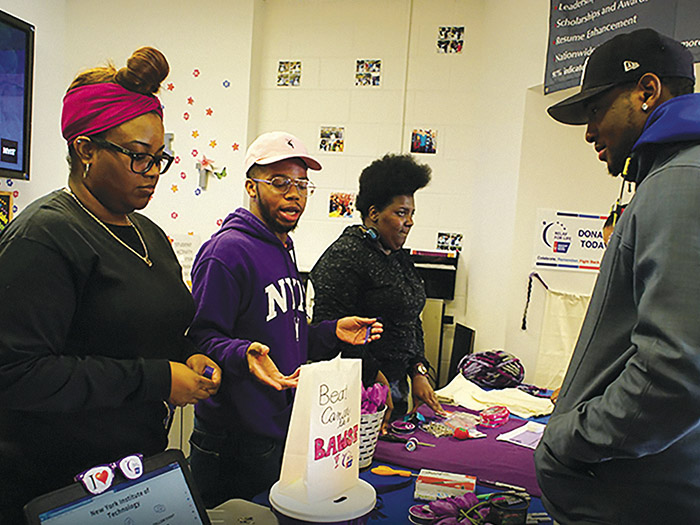
NYIT community members sign up volunteers for Relay for Life, which raises funds and awareness for cancer research.
If breakthrough research and new technology will drive NYIT’s future, our humanity will save it. A commitment to service and making the world a better place is another core element of President Foley’s vision for the university. On April 11, NYIT held its first Day of Giving, which encouraged the NYIT community to raise awareness about important causes, volunteer with local organizations, and learn about ways in which students, faculty, and staff are making a positive impact in communities.
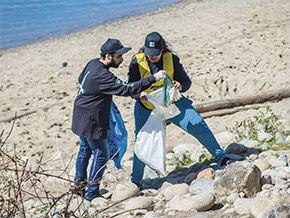
NYIT-Vancouver students clean up the shoreline near campus.
More than 800 faculty, staff, and student volunteers signed up for dozens of activities on and near NYIT’s campuses. For example, Long Island-based volunteers raised awareness for autism, while others cleaned up the Long Island Children’s Museum. Meanwhile, volunteers in Manhattan worked at a mobile soup kitchen in Penn Station, while others raised funds for “Relay for Life.” And NYIT students in Canada cleaned up garbage and debris from Vancouver’s shores.
Amy Bravo, senior director of International and Experiential Education, headed up the day. “We all have skills needed to improve our communities,” said Bravo. “Watching faculty and staff serve alongside students highlighted how impactful experiential learning is when we are all in it together. … Initiatives like this one showcase our commitment to the public purpose of higher education, and I can’t think of anything more meaningful than that.”
The health of the nation and the world is another crucial need that NYIT is addressing. Following Day of Giving, NYIT School of Health Professions Dean Sheldon D. Fields, Ph.D., hosted an event focusing on the Affordable Care Act (ACA). Panelists, including NYIT faculty members, discussed how ACA has affected their practices, whether healthcare should be mandatory, and how the opioid crisis has impacted healthcare.
These worthy events didn’t end with Inauguration Week. The ACA panel was held as part of the ongoing Dean’s Speaker Series, which invites professionals to talk about topics in healthcare throughout the year. And two weeks after Day of Giving, members of the community, undaunted by the rain, walked laps all night in the NYIT-Long Island Student Activity Center to raise awareness for cancer research and patients as part of Relay for Life. It’s an event NYIT has held for 10 years “walking.”
Day of Giving in numbers:
- More than 800 volunteers (students/staff/faculty)
- Nearly 900 community service hours performed
- 30+ COMMUNITY SERVICE ACTIVITIES OFFERED, INCLUDING WITH OUTSIDE ORGANIZATIONS
- APPROXIMATELY 1,900 INDIVIDUALS SERVED
- MORE THAN $1,000 RAISED FOR VARIOUS CAUSES
- MORE THAN 2,700 ITEMS (FOOD, BOOKS, ETC.) DONATED TO ORGANIZATIONS
#NYITPresident
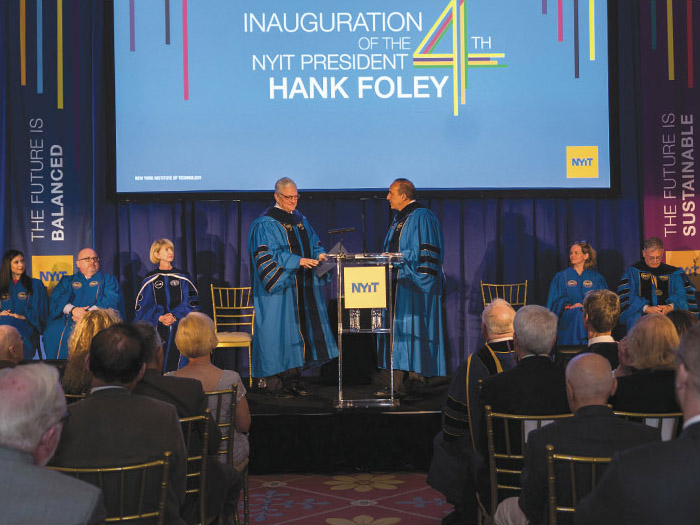
The official installation ceremony. (Left to right) Medical student Samantha Gottlieb, Fred Harris (B.S. ’08, M.B.A. ’10), alumni representative; Kristina Johnson, Ph.D., chancellor of State University of New York System; President Foley; Board Chair Kevin Silva; Laura Curran, Nassau County, N.Y., executive; and Edward Guiliano, Ph.D., past president of NYIT.
“I am honored, and I am humbled, and I feel quite privileged to be the fourth president of NYIT,” President Foley told academic, business and civic leaders, and members of the NYIT community who gathered to celebrate his official installation on April 12 in Manhattan. “But tonight is not a celebration for me,” he went on to say. “Tonight is a celebration of us. It’s we. It’s we thinking about our common vision, our mission, and our goals for the future.”
Shortly before he spoke, NYIT Board of Trustees Chair Kevin Silva, executive vice president and chief human resources officer at Voya Financial, presented the president with the seal of the university and a copy of the absolute charter as issued by the University of the State of New York Education Department.
“The mission of NYIT continues to be what it has always been: to provide access to high-value, professional education at a fair price without too many frills, and to offer it to students from all backgrounds who are hungry to succeed and to do well in life,” added President Foley. “I am proud to take the reins and lead this great institute into our collective future. Let us embrace the possibilities. NYIT’s best years lie ahead. Every success counts.”
This article was originally featured in the Summer 2018 issue of NYIT Magazine.

By Julie Godsoe
More Features

An Alumnus’ Commitment to the Environment
As an energy management graduate from New York Tech’s Vancouver campus, Jasdeep Gulati (M.S. ’22) is highly invested in educating people about environmental and climate sustainability.

Vancouver Faculty Win University-Sponsored Research Awards in New Program
The new Global Impact Research Grant (GIRG) program has been developed to keep Vancouver-based faculty connected to faculty and research projects being conducted on the university’s New York campuses.

Studying Climate Change One Degree at a Time
Junhua Qu (M.S. ’24) began her collegiate journey in Beijing. But, her interest in climate change took her to New York Tech’s Vancouver campus to study energy management.